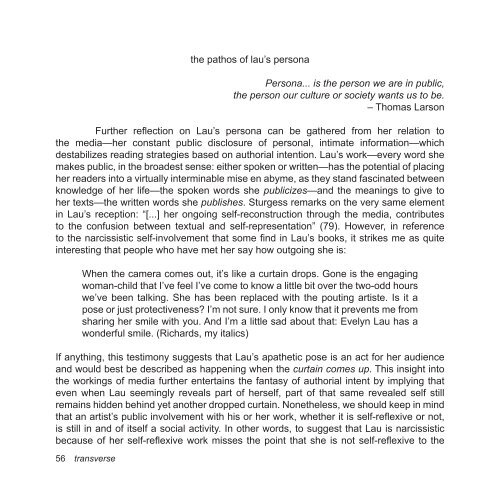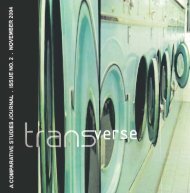Untitled - Centre for Comparative Literature - University of Toronto
Untitled - Centre for Comparative Literature - University of Toronto
Untitled - Centre for Comparative Literature - University of Toronto
You also want an ePaper? Increase the reach of your titles
YUMPU automatically turns print PDFs into web optimized ePapers that Google loves.
56 transverse<br />
the pathos <strong>of</strong> lau’s persona<br />
Persona... is the person we are in public,<br />
the person our culture or society wants us to be.<br />
– Thomas Larson<br />
Further refl ection on Lau’s persona can be gathered from her relation to<br />
the media—her constant public disclosure <strong>of</strong> personal, intimate in<strong>for</strong>mation—which<br />
destabilizes reading strategies based on authorial intention. Lau’s work—every word she<br />
makes public, in the broadest sense: either spoken or written—has the potential <strong>of</strong> placing<br />
her readers into a virtually interminable mise en abyme, as they stand fascinated between<br />
knowledge <strong>of</strong> her life—the spoken words she publicizes—and the meanings to give to<br />
her texts—the written words she publishes. Sturgess remarks on the very same element<br />
in Lau’s reception: “[...] her ongoing self-reconstruction through the media, contributes<br />
to the confusion between textual and self-representation” (79). However, in reference<br />
to the narcissistic self-involvement that some fi nd in Lau’s books, it strikes me as quite<br />
interesting that people who have met her say how outgoing she is:<br />
When the camera comes out, it’s like a curtain drops. Gone is the engaging<br />
woman-child that I’ve feel I’ve come to know a little bit over the two-odd hours<br />
we’ve been talking. She has been replaced with the pouting artiste. Is it a<br />
pose or just protectiveness? I’m not sure. I only know that it prevents me from<br />
sharing her smile with you. And I’m a little sad about that: Evelyn Lau has a<br />
wonderful smile. (Richards, my italics)<br />
If anything, this testimony suggests that Lau’s apathetic pose is an act <strong>for</strong> her audience<br />
and would best be described as happening when the curtain comes up. This insight into<br />
the workings <strong>of</strong> media further entertains the fantasy <strong>of</strong> authorial intent by implying that<br />
even when Lau seemingly reveals part <strong>of</strong> herself, part <strong>of</strong> that same revealed self still<br />
remains hidden behind yet another dropped curtain. Nonetheless, we should keep in mind<br />
that an artist’s public involvement with his or her work, whether it is self-refl exive or not,<br />
is still in and <strong>of</strong> itself a social activity. In other words, to suggest that Lau is narcissistic<br />
because <strong>of</strong> her self-refl exive work misses the point that she is not self-refl exive to the




